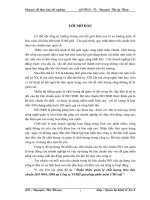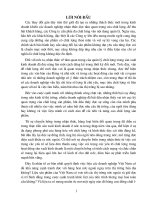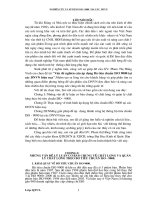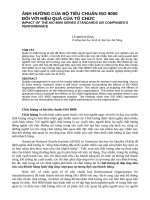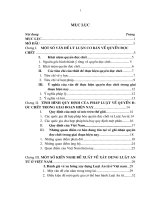Tiêu chuẩn iso 00661 2003
Bạn đang xem bản rút gọn của tài liệu. Xem và tải ngay bản đầy đủ của tài liệu tại đây (108.15 KB, 8 trang )
ISO
661
INTERNATIONAL
STANDARD
Third edition
2003-05-15
Animal and vegetable fats and oils —
Preparation of test sample
Corps gras d'origines animale et végétale — Préparation de
l'échantillon pour essai
Reference number
ISO 661:2003(E)
© ISO 2003
--`,,`,-`-`,,`,,`,`,,`---
Copyright International Organization for Standardization
Provided by IHS under license with ISO
No reproduction or networking permitted without license from IHS
Not for Resale
ISO 661:2003(E)
PDF disclaimer
This PDF file may contain embedded typefaces. In accordance with Adobe's licensing policy, this file may be printed or viewed but
shall not be edited unless the typefaces which are embedded are licensed to and installed on the computer performing the editing. In
downloading this file, parties accept therein the responsibility of not infringing Adobe's licensing policy. The ISO Central Secretariat
accepts no liability in this area.
Adobe is a trademark of Adobe Systems Incorporated.
Details of the software products used to create this PDF file can be found in the General Info relative to the file; the PDF-creation
parameters were optimized for printing. Every care has been taken to ensure that the file is suitable for use by ISO member bodies. In
the unlikely event that a problem relating to it is found, please inform the Central Secretariat at the address given below.
--`,,`,-`-`,,`,,`,`,,`---
© ISO 2003
All rights reserved. Unless otherwise specified, no part of this publication may be reproduced or utilized in any form or by any means,
electronic or mechanical, including photocopying and microfilm, without permission in writing from either ISO at the address below or
ISO's member body in the country of the requester.
ISO copyright office
Case postale 56 • CH-1211 Geneva 20
Tel. + 41 22 749 01 11
Fax + 41 22 749 09 47
Web www.iso.org
Published in Switzerland
ii
Copyright International Organization for Standardization
Provided by IHS under license with ISO
No reproduction or networking permitted without license from IHS
© ISO 2003 — All rights reserved
Not for Resale
ISO 661:2003(E)
Foreword
--`,,`,-`-`,,`,,`,`,,`---
ISO (the International Organization for Standardization) is a worldwide federation of national standards bodies
(ISO member bodies). The work of preparing International Standards is normally carried out through ISO
technical committees. Each member body interested in a subject for which a technical committee has been
established has the right to be represented on that committee. International organizations, governmental and
non-governmental, in liaison with ISO, also take part in the work. ISO collaborates closely with the
International Electrotechnical Commission (IEC) on all matters of electrotechnical standardization.
International Standards are drafted in accordance with the rules given in the ISO/IEC Directives, Part 2.
The main task of technical committees is to prepare International Standards. Draft International Standards
adopted by the technical committees are circulated to the member bodies for voting. Publication as an
International Standard requires approval by at least 75 % of the member bodies casting a vote.
Attention is drawn to the possibility that some of the elements of this document may be the subject of patent
rights. ISO shall not be held responsible for identifying any or all such patent rights.
International Standard ISO 661 was prepared by Technical Committee ISO/TC 34, Food products,
Subcommittee SC 11, Animal and vegetable fats and oils.
This third edition cancels and replaces the second edition (ISO 661:1989), of which it constitutes a minor
revision.
iii
© ISO 2003 — All rights reserved
Copyright International Organization for Standardization
Provided by IHS under license with ISO
No reproduction or networking permitted without license from IHS
Not for Resale
--`,,`,-`-`,,`,,`,`,,`---
Copyright International Organization for Standardization
Provided by IHS under license with ISO
No reproduction or networking permitted without license from IHS
Not for Resale
INTERNATIONAL STANDARD
ISO 661:2003(E)
Animal and vegetable fats and oils — Preparation of test
sample
1
Scope
This International Standard specifies procedures for the preparation of a test sample from a laboratory sample
of animal or vegetable fats and oils for the purpose of analysis.
The method is not applicable to emulsified fats such as butter, margarine or mayonnaise.
2
Principle
The fatty matter is mixed, with heating if necessary, to an appropriate temperature. If required, insoluble
substances are separated by filtration and water is removed by drying with anhydrous sodium sulfate.
3
Reagent
3.1
4
Sodium sulfate, anhydrous.
Apparatus
4.1
Electric drying oven, with means of temperature regulation.
4.2
Heated filter funnel.
5
Procedure
5.1
Mixing and filtration
5.1.1
Liquid sample, clear and without sediment
Ensure that the laboratory sample is as homogeneous as possible by shaking the closed container.
5.1.2
5.1.2.1
Liquid sample, turbid or with sediment
Proceed as follows for the determination of
a)
moisture and volatile matter,
b)
insoluble impurities,
c)
mass per unit volume, and/or
d)
any other determination requiring the use of unfiltered samples or if the determination is affected by heat.
1
--`,,`,-`-`,,`,,`,`,,`---
© ISO 2003 — All rights reserved
Copyright International Organization for Standardization
Provided by IHS under license with ISO
No reproduction or networking permitted without license from IHS
Not for Resale
ISO 661:2003(E)
Vigorously shake the container (holding the laboratory sample) until the sediment is completely separated
from the walls of the container. Immediately pour the sample into another container and check that no
sediment remains adhering to the walls of the original container; if it does, remove it completely (if necessary,
cutting open the container) and incorporate in the body of the sample.
5.1.2.2
For all other determinations, place the container holding the laboratory sample in the drying oven
(4.1) controlled at 50 °C. Leave it until the sample has reached this temperature and then proceed as in 5.1.1.
If, after heating and mixing, the sample is not completely clear, filter the oil, carrying out the operation inside
the oven maintained at 50 °C or by means of the heated filter funnel (4.2). Do not leave the sample in the
oven for longer than necessary, in order to avoid any modification of the fatty matter by oxidation or
polymerization. The filtrate shall be perfectly clear.
5.1.3
Solid sample
5.1.3.1
For the determinations a) to d) specified in 5.1.2.1, gently warm the laboratory sample until it is
just mixable and mix thoroughly in order to render it as homogeneous as possible.
5.1.3.2
For all other determinations, melt the laboratory sample by keeping it in the drying oven (4.1),
controlled at a temperature at least 10 °C above the melting temperature of the particular fat or oil. If, after
heating, the sample is perfectly clear, proceed as in 5.1.1. If it is turbid or if it contains a sediment, filter it as
the chosen temperature, either inside the oven or by means of the heated filter funnel (4.2). The filtrate shall
be perfectly clear.
5.2
Drying
If the mixed sample still contains moisture (especially in the case of acid oils, fatty acids and solid fats), it shall
be dried for those determinations in which the results may be affected by the presence of moisture (for
example iodine value), taking all necessary precautions to avoid its oxidation. For this purpose, keep part of
the thoroughly mixed sample (see 5.1.1, 5.1.2.2 or 5.1.3.2, as appropriate) in the drying oven (4.1) for as short
a period as possible, at a temperature 10 °C above the melting temperature, preferably under nitrogen, after
having added anhydrous sodium sulfate (3.1) in the proportion of 1 g to 2 g per 10 g of oil or fat. Never dry at
a temperature in excess of 50 °C.
Sodium sulfate loses its property as a desiccant at temperatures above 32,4 °C. It may therefore be
necessary to dry under vacuum. Those fats for which a drying temperature above 50 °C would be necessary
should be dissolved in a solvent and then dried.
Vigorously stir the heated sample together with the anhydrous sodium sulfate, then filter. If the fat or oil
solidifies on cooling, carry out the filtration in the drying oven (4.1) or by means of the heated filter funnel (4.2)
at an appropriate temperature which shall never exceed 50 °C.
6
Storage
Samples should be stored under conditions suitable for the type of sample and the tests to be carried out.
--`,,`,-`-`,,`,,`,`,,`---
2
Copyright International Organization for Standardization
Provided by IHS under license with ISO
No reproduction or networking permitted without license from IHS
© ISO 2003 — All rights reserved
Not for Resale
--`,,`,-`-`,,`,,`,`,,`---
Copyright International Organization for Standardization
Provided by IHS under license with ISO
No reproduction or networking permitted without license from IHS
Not for Resale
ISO 661:2003(E)
ICS 67.200.10
Price based on 2 pages
© ISO 2003 — All rights reserved
Copyright International Organization for Standardization
Provided by IHS under license with ISO
No reproduction or networking permitted without license from IHS
--`,,`,-`-`,,`,,`,`,,`---
Not for Resale
